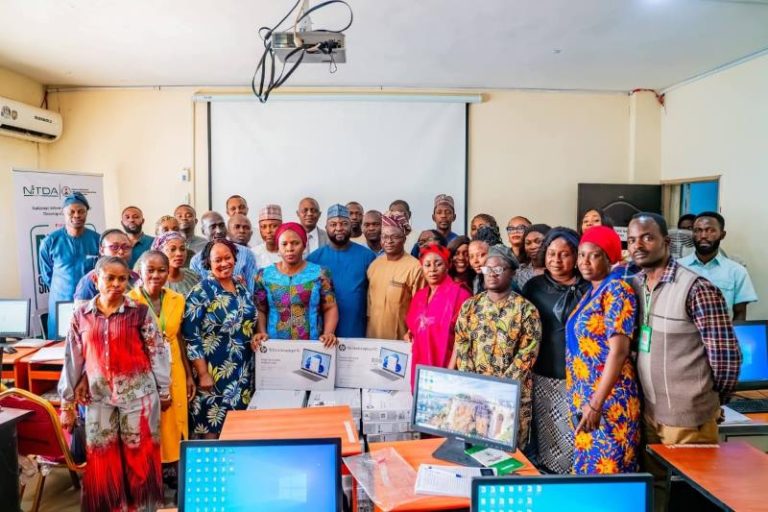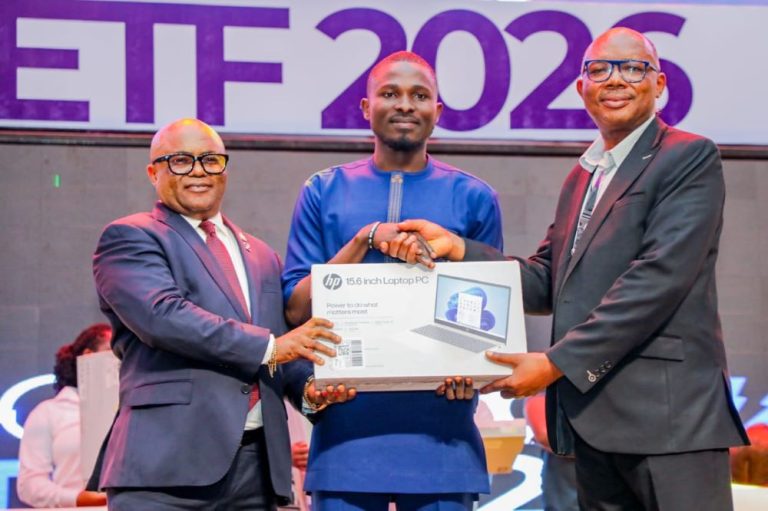The man Mr. Patrick Ede is The Director of Operations, PPC Integrated Systems (formerly Philips Projects Centre, an affiliate of Philips Electronics N.V. of the Netherlands) and one of the leading providers of integrated IT services in Nigeria. In this no-holds-bare interview he discloses what the government must do to drive a successful digital economy among many other issues. Excerpts:
How would you access your organisation’s performance within the period?
The year was for us in this country an election year. The planning was difficult to start with. A lot of people did not really get to see how things will happen after the election. So, what was important was hoping that the year 2019 would be fine. It was difficult to plan because in the election year there was a lot of confusion of how the economy would go; if the incumbent government would continue or a new government would emerge. You know how it works here. A new government will come with new ideas and they try to change what is in existence but post-election things started happening; people started having some discussions and most organisations started planning. And for PPC we had a plan and of course we watched the election go through and after the election things started happening; some new projects and jobs. All in all it was really a challenging year.
Can you tell us about the PPC’s operations and visions and of course how much that has impacted in the growth of the industry and the country as a whole?
Initially as a company, PPC was more into ICT and we were also doing Medicom and it has not changed. What has happened is that we have also diversified into some additional operational verticals in transport, power and building services in engineering. So we have expanded and if I look at PPC in the ICT, if you go out and mention PPC, you would find out that over more than 25 years we have been in the industry. We are part of the players that started and drive the ICT industry in Nigeria. We are still here hoping that we are going to do much better.
Talking about the ICT industry, in your own assessment, is the industry achieving its potentials?
The post liberalization of the Telecom industry gave room to the harnessing of the potentials of the ICT industry, though it is even; at the best we still need some skills because the skill sects in Nigeria is not what it should be, although a lot of individuals are making efforts on their own but for me, in all we are chasing what others are chasing elsewhere in the world.
Obviously, ICT industry faced lots of challenges last year. In your opinion what are those specific challenges that can be improved on?.
Yes, quite a lot. You hear them talking about broadband penetration. Broadband is still not yet there; the right of way issues for telcos, because the right of way is also a big challenge; rural telephony, rural communication, rural internet penetration; all are going to ride on the broadband and the right of way issues then getting to the fibre wares into the rural areas; we will still not get to where we are going if some of those things are not addressed. And then we need the government that can stay to ensure the right things are done. A minister recently was talking about eGovernment and talking about that same development over penetration. We need action and not just talk because when it happens the impact will be very real.
Looking at these things you talked about broadband and its challenges, in your perspectives, how do you think these things can be achieved?
I have said it, you know there is a committee on broadband penetration which Funke Opeke and others are in the team; there is also the local content issue which I did not mention earlier and we are going to get it done. So, if we have committee on that, it is not just working, I keep saying you can set up a committee with some intelligent and bright guys to deliberate on what should be done; most importantly we need the government to help, to support the drive because the broadband penetration and the right of ways issues are addressed properly as the recommendations would be. Then you will find out that the IT industry would meet its goals and targets.
As an organization, PPC has been pivotal in the IT ecosystem especially in the last two decades or more, what has been the secret of your success and what are the new opportunities we should be looking forward to?
Secret of success? It is a difficult question. We survived on the wills of God’s favour and also on the back of a wonderful Executive Chairman whose vision has been like open a door for potentials and very skilled people to exhibit their skills. When you come in with your ideas you put it on the table and it is worked on. And of course, when you do that people are motivated to put up their best and that is one secret that is open that if your staff are motivated in such a way that they put up their ideas and those ideas are used and their royalties are assured; most times they will want to be there to be part of the accomplishment. And over more than two decades now it has been the training and development of skills in PPC. It is a good one and of course, I believe that we are still doing and there are plans to do more. The personnel actually are the main reason for our existence; if they have the right skill and the right training they will keep us in business.
How much has your organization contributed to the GDP of the nation?
I cannot categorically say that but I want to state that we are one of the initiators of private Telecoms operations; during the NITEL days we used to have one PPC network which was to take the deadlines or nonworking lines from base to different areas. We set up private network before the take of, of liberalization; we were there and by 1995 we were supporting the NITEL taking those lines to areas where the cables were not able to reach. And looking at that, that was a good contribution and from there onwards the changes that became what we have as Telcos, joined the site construction and telecom development initiative, the fibre implementation; we were part of the people who initiated and implemented fibre networks for companies. So I cannot actually categorically say what it is because for you to measure the GDP you have to compare to what have I done and to other companies. I know we are one of the first 100. If you count 100, apparently we are one of the first 10 not necessarily financial but I am looking at the contribution in terms of what we have done to project the ICT industry. Basically, we are part of the first 10 that made impact in the industry but in our pocket that is a different story, we will have to look and work that out.
Projecting into 2020, what is your business corporate objective?
As I said at the beginning, we are looking at the industry where we are building service engineering but it is a different vertical now. We are focusing on construction company doing ELSO Seed, ELV in terms of CCTV, Access Control, Building Management Systems, CATV or MATV and those things you have in the hospitality industry like the hotels, the pub buildings; we have a vertical force focusing on them. We also have a team focusing on power generation, power distribution, energy for telecom and other companies and services. So that thing is in our objectives that the two verticals grow chasing the ICT and the medical. We are already doing the medical and also the ICT which was originally the core. We also have our hands in transport; we have the Lagos Cable CAT project and then the rail project too. All these and more are what we think will boost the existence of PPC in 2020.
What is PPC doing to ensure capacity building and relevant partnership to remain on top of the business?
The last part of the year 2019 and the beginning of year 2020 which is January, we did what we called strategic planning. We look at what skills we have in-house, we look at the skills we need to develop and we look at the skills we need to hire. First of all, opportunities are given to those in-house to be able to go up. So there is a scheme development plan in about five keys areas geared towards developing skills in terms of technical capability, sales and marketing capability of those areas. These things are done already and then at the end of January, we have a roll plan that defines time of trainings of staff in different areas of need. After these have been done, we now know where there is gap and decide on the relevant skills that would be hired to add to the work force; so that is what drives the system all these years. The personnels and we cannot roll back on that rather we up our game to putting the right skills to drive the system.
Recently, the federal government added digital economy to the Federal Ministry of Communications, what is your take on that?
One good move, I keep saying “action”; I know that is in writing. Action, they have to. One is you hear everybody taking about AI, then I mention eGovernment; eGovernment platform or infrastructure development is a requirement for revenue, loans and grants from the world financial bodies and of course, it is going to help to find out or open up for a transparent way of managing and monitoring the funds you are getting from all these institutions. If you have a digital economy it is a transparent way to cover up funds because you will see what you are doing. It is a way to measure your actuals without gesticulation in the sense that you can easily say, for the police in this country they are 100 and they are existing you can be sure because you will do biometric capture; you can easily capture the guys and see that it is not a fake number.
There was somewhere we were working, the initial government projection was N7billion or N6.5billion and by the time they did some digital analysis and biometric capture and people go to register themselves, they found out that they only needed N3billion. Somebody projected their need of N6.5billion and when they did a proper biometric capture of their personnel they found out that their monthly running cost is N3billion and not N6.5billion as indicated. Those are the right things you get and may be, when we become fully digital economy you will find out that a lot of waste would be cut, corruption would be seriously minimized. There is a lot of colossal waste that is experienced by people doing manual estimation. For example, you see the difference using your prepaid meter and the other analog estimate meter. The difference is that with prepaid meter you buy only what you need. Let us assume that if Nigeria says we want to now be a prepaid economy, where you spend and buy what you need and then what you do not need does not come. We are living on estimate and nothing is working because here are too many estimations, no record in the past, ask for the file, the guy would tell you there is no record.
So if we become a full digital economy, we would be able to capture a lot even the analytical trend of things and processes would be well defined. And when you are doing budgeting it would be easy for you to pick up things and put them in the right perspectives. And then people would also openly and easily monitor the activities and performances of different areas even the revenue generation, you would find out that the monies coming into the government can properly be recorded; because just do what they want and then enter what they want in the system, but if we use some digital method all these entries and processes would be done very easily.
What key areas would you advise the government to focus on in order to achieve our quest to harness the digital opportunities?
I often talk about eGovernment; eGovernment encompasses the infrastructure which at PPC we have done so much and we have so much design. We have done designs that focuses on government to government; government to citizens, government to enterprises. There are different modules for taxation, for staff database management systems and all that. You will build the infrastructure in the sense that you will network those systems; you will create some data centres and some from the states and you will find out that if you do proper integration of the network you will have over-capacity that both the state and the federal government will benefit. At PPC we have a lot of designs already and a working system we have implemented, for example in Bayelsa, which we commissioned; about 95 percent of that module is in operation. It is a live system now and you could go there to see. They do once in a year every staff will come to capture. I think they are trying to reduce it to six months so that they can register people to know if they are leaving and existing. Apart from that, from your card there is another interface of it which you can use your ATM card and information is added to it to capture your details, you use it to pass the gate, to collect money and all transactions you want to do. So these are different working modules of the system and we have so many of them which eGovernment can be harnessed with. That is what will drive digital economy otherwise we are not just going anywhere.
Talking about eGovernment, where do you see the ICT industry in the next five years?
There is daily evolving system technology in ICT; if you go for an event today and repeat that same event in six month, you will find out that, for example, if you take your phone you will discover that they make it in three or four different modules in a year. So, for me say five years, it is a lot of time. Talking about AI, if you go to some states in the US like Washington DC area, they are already trying the ICT; if you look at what they have done in China there is AI and some other things. The speed at which they implement those things is amazing; people are working round the clock to improve on their technology. So if you say five years, for us in Nigeria, we can say in five years we can probably be AI compliance. But for other developed countries, in two years would be far deep in compliance. If you recall what I have said talking about broadband penetration and all those right of way and creating the fibre requirement for rural communications and all others and then you will say fine, in five years’ time if the government drives it, the AI is possible in some areas; it may be possible in everything that you do but that is the change has come. It is not waiting for five years, it is already now; but in five years you start talking more of Internet of Things (IoT) including yourself and you already working for some people where wash and massage your hands, feet and all that. So it will become more visible, where you are driving your car you will see what is happening anywhere you going; you can see your house and who is visiting you and you can talk to the person even when you are on the way.
So the IoT area is where you will probably be because the IoT is going to ride on back of broadband activities and the 5G technology. The 5G has already started running in some areas in Nigeria but not in all areas but you can ride on it to do the IoT and of course, you will be expanding. And that will create a lot of employment; people think when the AI comes and all other ones, employment will be reduced. No, it is a replacement of jobs, it is an improvement. Since the day the computer was discovered that is the year AI started existing. What has happened is that, things started working. Now you can do a lot of mathematics without thinking on your own; you now find out that what has improved is the height of AI is improving that technology to make a lot of things happen on their own. I watched the new Google bicycle riding itself in the Netherland. You can hire the bicycle and it will come to you to take you to wherever you want to go.
It will get to Nigeria someday, you think it is very far? It will get here and that very five years you will be shocked on the transformation that would have happen.
https://any.peopleandpowermag.com/egovernment-will-drive-digital-economy-patrick-ede/




